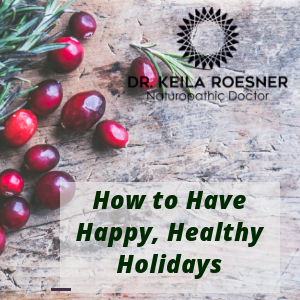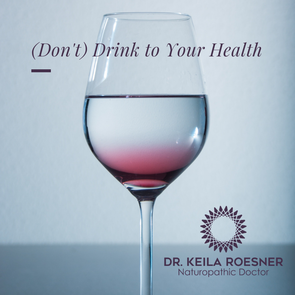 Are you enjoying the final stretch of the year? It’s a fantastic and fun time of the year. Unfortunately, it’s also a difficult period for maintaining healthy habits. Check out our list of the top 10 ways to stay healthy and happy over the holiday season. 1. Reframe your holiday expectations. Consider this: If you think of the holidays as an exhausting test of your endurance, and holiday treats as evil temptations to be resisted with all available willpower, how will your body react? That might be a bit of an exaggeration, but many patients come into the office at this time of the year showing signs of anxiety and tension. In fact, one study found that 90 percent of adults feel stressed over the holidays. Isn’t this supposed to be a joyous time? These high stress levels may be at least partly attributed to the fact that many of us simply have more to do at this time of the year. Because we have more tasks to keep track of (even if those tasks are going to parties, buying gifts, and other fun stuff), our prefrontal cortex (in our brain) is overtaxed. This can affect our memory and overall ability to cope. Add in the extra pressure of maintaining a perfect diet and workout schedule, and you have a recipe for sleep problems, digestive difficulties, and tense muscles - all of which can add to our stress. And when we’re stressed, we tend to overeat. You can probably see why holiday stress can create a vicious cycle of guilt. Reframing our expectations that we need have a “perfect” holiday while staying disciplined can end the frustration. So don’t beat yourself up if everything doesn’t go as planned. In the long run, our happiest memories are sometimes the ones when things didn’t go as we’d pictured them, or the times we slowed down to take in the moment. Letting go of expectations of perfection (from ourselves and others) will ultimately help our health. 2. Play games. If you get together with family or friends in the next weeks, why not introduce a low-tech way to have some old-fashioned fun by playing board games? Board games can also offer cognitive benefits - not that you need an excuse to start rolling the dice. 3. Stay mindful. A mindfulness practice has obvious benefits when we’re extremely busy. Even if you’re not a regular meditator, just five minutes a day of meditation can help you cope with holiday stress. And why not share the love? Suggest a short meditation before holiday meals. It can set the tone for a peaceful celebration. Studies show that group meditation can have powerful results. Our office has regular drop in meditation groups! 4. Get moving. Fitting in some exercise can be easier when you mix it up by with physical social activities with loved ones. Snowshoeing, making snowmen, skating for those in the cold climates: there are plenty of options. If you’re not a cold-weather person, try bowling or a trip to the pool. You may not end up with six-pack abs, but might start a new holiday tradition. Suggesting fun activities for social gatherings also helps take the focus off food. 5. Cook up some love. Looking for a unique gift idea? Want to stay away from the mall and its atmosphere of seemingly relentless consumerism? Try baking some holiday gifts. For example, put some homemade sweet and spicy holiday almonds into a fancy jar (you can find a good recipe here: https://mywholefoodlife.com/2012/11/28/sweet-and-spicy-holiday-almonds/). Or wrap up a box of vegan hazelnut cups. (This recipe is amazing! https://www.mindbodygreen.com/0-16557/like-nutella-try-these-vegan-hazelnut-cups.html) or even start making some natural soaps as gifts, it’s easy, natural and fun! 6. Go green. When you’re thinking about ways to keep your body healthy over the holidays, don’t forget that the planet deserves love too. It’s easy to have a green holiday season (even if it’s snowing). Use recycled wrapping paper, serve food on real plates (not paper), and consider turning the heat down a degree or two for large gatherings (maybe you’ll encourage guests to bring out their tacky holiday sweaters). To conserve electricity, use LED lights only, and defrost your freezer before you load it up with holiday baking. 7. Learn to say no. This is a tough one for many patients who come to the office. However sometimes refusing a social invitation or a request to do work is the healthiest choice for everyone involved. If you find it hard to turn down an invitation or request, remember that you don’t have to apologize. Decline right away and resist the urge to make up an elaborate excuse. Suggest an alternative activity or a later date - but only if you really want to. 8. Keep your gut healthy. Sugar laden holiday treats, cocktails and parties galore can really put a damper on your gut health. Rightfully so an imbalance of extra sugar lowers both your immune system and can lead to an imbalance of healthy bacteria in the gut. Take some high quality probiotics and some digestive enzymes prior to meals to give your gut a healthy boost and some likely much needed assistance! 9. Start some healthy food traditions. The internet is bursting with healthy holiday recipes. Think about your loved ones’ food preferences and find some yummy dishes to bring to gatherings. For example, here are some outstanding vegan dishes: https://minimalistbaker.com/christmas-recipe-roundup/. Other guests might thank you for providing an alternative to Aunt Mary’s special salad! Try replacing carb heavy side dishes with healthy ones like Rutabaga and carrot mash or creamy butternut squash and thyme! Looking up Paleo versions of your favorites is often a good place to start too. Remember it’s OK to say no! 10. Be grateful. The holidays don’t always go as planned. Sometimes we have to go to work instead of eating great meals. Sometimes we miss people who are no longer in our lives. It’s normal to experience sadness at this time of the year. Acknowledge your feelings and be gentle with yourself. Take some time to think of the good things (even if they’re not always picture-perfect). Grateful people experience better sleep, more optimism, and improved relationships. And we could all use a bit of that at this time of the year. Happy New Year from all of us! We look forward to working with you to create a fulfilling and healthy start to 2019. Sources
3 Comments
 A glass of wine with dinner. A beer after a hard day of work. It’s not hard to integrate an occasional drink with a healthy lifestyle. Whole genres of music are written essentially about drinking (I come from a country music family!). In recent years, we’ve read that red wine is rich with antioxidants, and that an occasional beer can raise “good” cholesterol or stimulate lactation for breastfeeding mamas. But results from a new study suggest that even moderate alcohol consumption - the kind we tell ourselves is healthy - may actually be detrimental to our health. In other words, the much-heralded health benefits of drinking don’t outweigh the risks. As a result, there is no safe level of alcohol consumption. A recently published research study looks at data collected in almost 700 studies, spanning 195 countries and territories. Some of the findings are startling:
The authors of the study are firm in their conclusion: “By evaluating all associated relative risks for alcohol use, we found that consuming zero standard drinks daily minimizes the overall risk to health.” In other words, the only safe amount of drinks is none at all. This finding differs from many earlier studies, which often concluded that moderate drinking was the best approach. Why did this study reach a more decisive conclusion than previous examinations of alcohol’s effect on health? Several factors come into play. This study was careful to consider the ways they measured consumption. For example, researchers looked at regional variations in alcohol consumption that could be attributed to things like tourism. In addition, the study looked at alcohol’s impact on 23 different health-related problems. For some of those problems (such as heart disease), mild alcohol consumption had a positive effect. But that positive effect was balanced by a greater negative impact on other health issues (cancer is a strong example). What does this mean for you? If you drink, should you stop? Alcohol consumption is a very personal decision. This study looked at the big picture, worldwide. It was not studying individuals, but rather analyzing vast amounts of data previously collected, specifically looking at the risks for the 23 health issues. That data was conclusive. But it’s up to you how you apply it to your own life. This latest study can’t, for example, tell you if it’s OK to have some wine for New Year’s given your own unique genetics and other lifestyle factors. One thing is clear: If you’ve told yourself that drinking is healthy, you may want to reconsider that rationale. That doesn’t necessarily mean you must immediately quit. However in deciding whether or not alcohol is something you want in your life, it’s best to be realistic about the health risks. If you’re wondering about alcohol, talk to a healthcare practitioner. And be upfront about your drinking during the visit. Many people underreport how much they drink, but it’s best to be honest. You want to have an open discussion about all of your health concerns. Remember that healthcare providers aren’t looking to judge you: they want to work with you to create your best life. You also want to look at your own medical history and perhaps check out more specific studies. For example, another recently published study concluded that alcohol is the biggest controllable risk factor for dementia. If you have other dementia risk factors that are out of your control, such as a genetic history, you may want take action on the things you can control. Similarly, if you have a history of depression, consider alcohol’s impact on mental health. If you are trying to control your weight, the extra calories of alcohol aren’t going to help. Alcohol can also lower your judgment and keep you from making your best decisions. Alcohol intake may also increase your risk of estrogen dominance, and is a well-established risk factor for breast cancer. Some patients express frustration at the different results they see in health studies: One minute something is good for you, then suddenly we need to avoid it! Studies on alcohol use can be proof that when we read an eye-catching health-related headline, we need to look beyond the numbers. One thing to keep in mind is that the media will typically seize the most dramatic sound bite, although it’s impossible to always convey the nuances of a well-run scientific study in a short headline. For example, a news story doesn’t always mention who funded the study. For the record, the Lancet study on alcohol safety was funded by the Bill and Melinda Gates Foundation, while some others that emphasized alcohol’s benefits were funded by companies who sell alcohol. That doesn’t necessarily mean the studies are false, but we should all remember the funders have a vested interest in how the results are reported. Follow the money! As well, correlation doesn’t always equal causation. That’s sometimes hard to capture in reporting large studies. In fact there are studies that show that Resveratrol an antioxidant found in red wine is beneficial to your health however if you have other health issues like digestion.htmlpoor gut function, low energy, sleep issues and more, alcohol will likely have negative impacts and could make your health issues worse. One can absolutely gather the benefits of resveratrol by eating organic grapes with the skin on, rather than drinking wine, without negatively affecting other health issues - but that doesn't make for sexy headlines! Whenever you’re confused about a health issue, the best approach is to consider it from a sample study of one: yourself. That means talking to a healthcare provider about your own personal history and choices and your current health concerns. We can help you sort through all of the information you face every day and figure out what’s best for your unique body, in fact we are experts in doing just that! Book your complimentary Health Discovery Consult to discuss YOUR unique health goals. References |
Top 75 Naturopath Blogs & Websites For Naturopathic DoctorsAuthorDr. Keila Roesner is a Naturopathic Doctor. When not treating patients she is also an enthusiastic barefoot-strolling, music-loving, yoga-doing kitchen wiz - who also happens to be a wrestling fan. Categories
All
|
Let us take you from hormonal to whole.
|
Dr. Keila Roesner, BHSc ND
Naturopathic Doctor, Hormone Warrior and Your Wellness Cheerleader 247 Church Street, Stratford ON N5A 2R7 (519) 273-0900 [email protected] |
|






 RSS Feed
RSS Feed